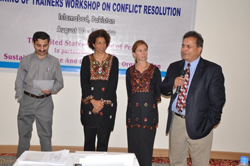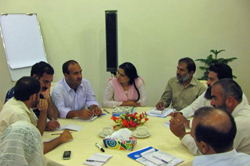The North-West Frontier Province (NWFP) and the Federally Administered Tribal Areas (FATA) of Pakistan are two of the most troubled provinces of Pakistan. The porous border areas between Pakistan and Afghanistan suffer from serious violent conflict due to the Taliban’s heavy presence in these areas.
Posted: September 2, 2009
By Nina Sughrue
The North-West Frontier Province (NWFP) and the Federally Administered Tribal Areas (FATA) of Pakistan are two of the most troubled provinces of Pakistan. The porous border areas between Pakistan and Afghanistan suffer from serious violent conflict due to the Taliban’s heavy presence in these areas. The people who are suffering the most are the impoverished local population who are terrorized by these extremists. While most of what is written about these areas is negative, there is a positive story to be told.
 In conjunction with a Pakistani non-governmental organization (NGO), the Sustainable Peace and Development Organization (SPADO), on August 10-12, 2009, United States Institute of Peace Senior Program Officers Nina Sughrue and Linda Bishai conducted the first in a series of workshops on capacity building. This workshop intends to build a network of peace facilitators in the NWFP and FATA areas of Pakistan. This particular Training of Trainers (TOT) program was conducted in Islamabad. The level of enthusiasm for this peacebuilding program was overwhelming. According to SPADO, more than 600 people applied to participate in the USIP-sponsored program. Out of 600 applicants, 42 people were chosen.
In conjunction with a Pakistani non-governmental organization (NGO), the Sustainable Peace and Development Organization (SPADO), on August 10-12, 2009, United States Institute of Peace Senior Program Officers Nina Sughrue and Linda Bishai conducted the first in a series of workshops on capacity building. This workshop intends to build a network of peace facilitators in the NWFP and FATA areas of Pakistan. This particular Training of Trainers (TOT) program was conducted in Islamabad. The level of enthusiasm for this peacebuilding program was overwhelming. According to SPADO, more than 600 people applied to participate in the USIP-sponsored program. Out of 600 applicants, 42 people were chosen.
These fearless participants came with various backgrounds: a mix of police, NGOs, district government, federal government, academics, religious scholars and journalists. Men and women of all ages were represented, all of whom are working towards peace and justice in the unforgiving environments of the NWFP and FATA.
Similar to USIP’s Iraq and Afghanistan facilitators program, this is a series of workshops with the goal of establishing a network of peacebuilders. USIP trainers taught the Institute’s conflict resolution portfolio of conflict analysis, communication skills, conflict styles, negotiation, mediation, problem solving and training techniques through lecture and interactive role-playing exercises.
In preparation for the next workshop planned for this November, the participants were given homework to be completed by the next workshop.
 Because this was a TOT program, participants were broken up into seven groups; each group is responsible for putting together a training module on one of the topics taught in the workshop. The participants will then present their materials to each other at the November workshop -- essentially training each other in the conflict resolution theory and techniques taught by USIP trainers. SPADO will monitor the groups’ progress and will advise USIP of the status of their work throughout the upcoming months.
Because this was a TOT program, participants were broken up into seven groups; each group is responsible for putting together a training module on one of the topics taught in the workshop. The participants will then present their materials to each other at the November workshop -- essentially training each other in the conflict resolution theory and techniques taught by USIP trainers. SPADO will monitor the groups’ progress and will advise USIP of the status of their work throughout the upcoming months.
The purpose of this is for the participants to take USIP frameworks on conflict resolution and directly apply them to the local context of the NWFP and FATA regions of Pakistan. This strategy also gives the participants ownership of the conflict resolution materials early on in the process, creating greater enthusiasm for the materials as it applies to their local context.
Pakistani Attorney General Latif Khan Khosa gave the closing remarks of the workshop. His eloquent, emotional address highlighted the need for such efforts as he praised the participants’ courage. All of them are risking their lives to promote peace.
After the closing ceremony the group took the initiative to give this new network of peacebuilders a name. The group chose aman -- meaning “alliance” in Urdu. USIP is honored to be working with such local partners such as SPADO and with such committed peacebuilders. This is the beginning of a long-term effort to develop local capacity to build peace and we are enthusiastic to start with such a solid core group of individuals.



